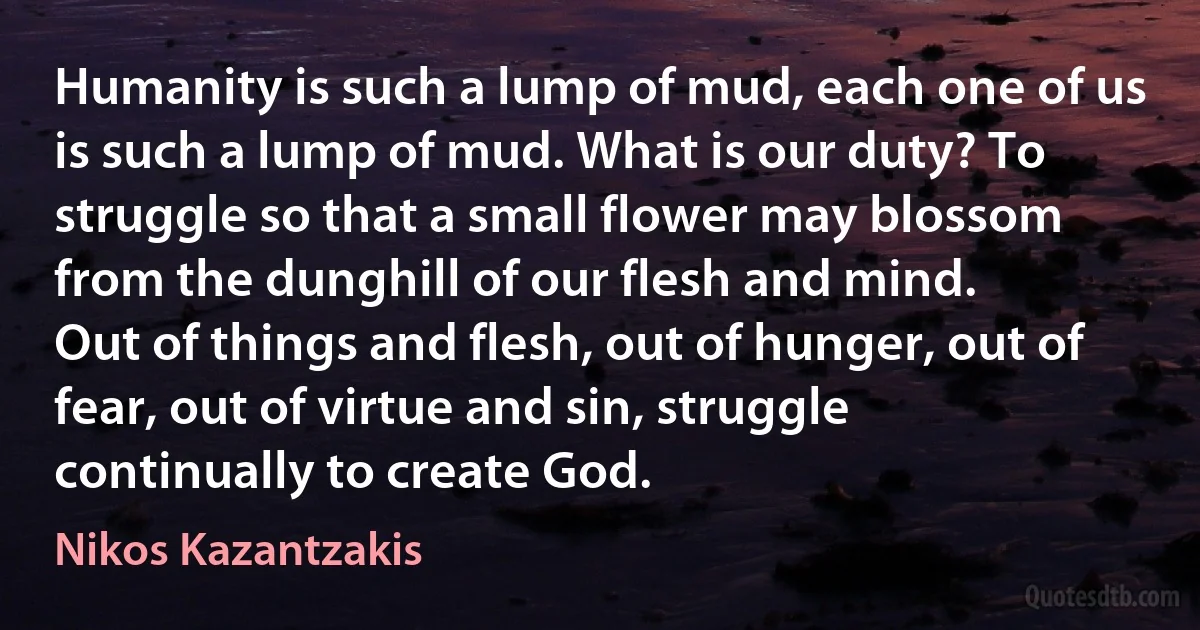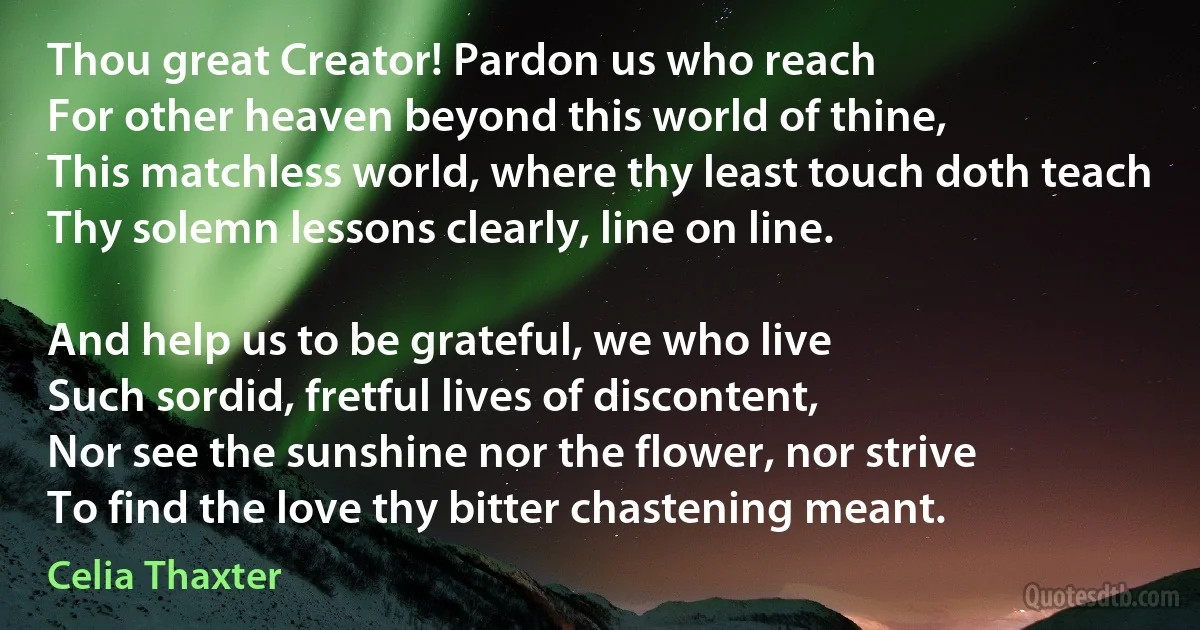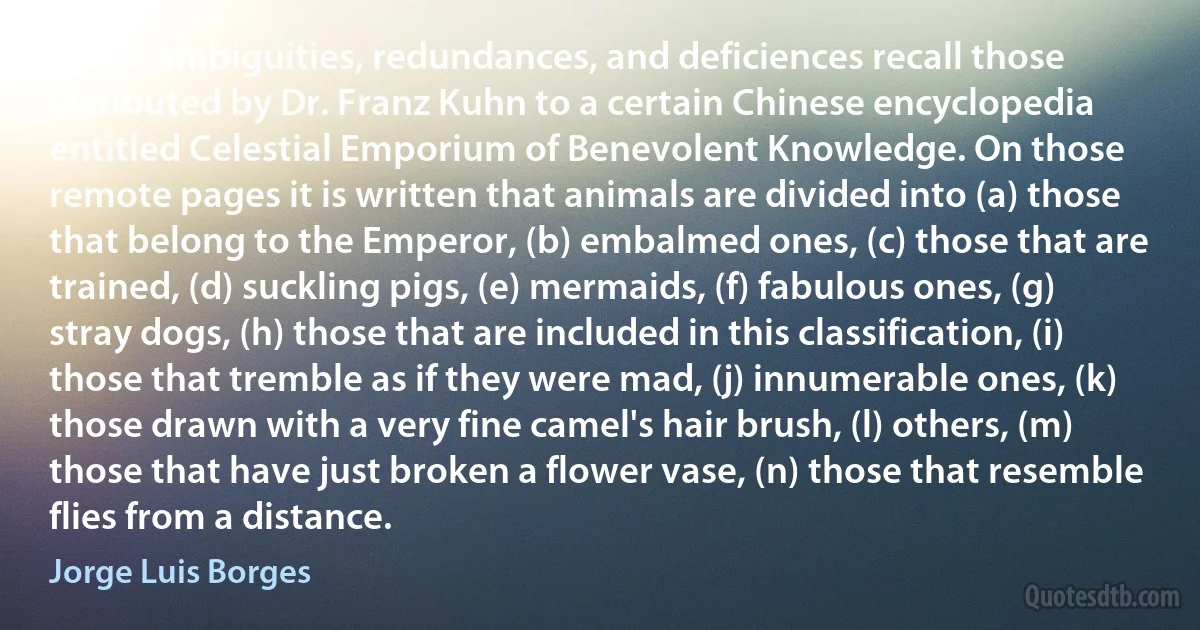Flower Quotes - page 30
What wonder if the novel claim had clashed
With old requirement, seemed to supersede
Too much the customary law? But, brave,
Thou at first prompting of what I call God,
And fools call Nature, didst hear, comprehend,
Accept the obligation laid on thee,
Mother elect, to save the unborn child,
As brute and bird do, reptile and the fly,
Ay and, I nothing doubt, even tree, shrub, plant
And flower o' the field, all in a common pact
To worthily defend the trust of trusts,
Life from the Ever Living: - didst resist -
Anticipate the office that is mine -
And with his own sword stay the upraised arm,
The endeavour of the wicked, and defend
Him who, - again in my default, - was there
For visible providence: one less true than thou
To touch, i' the past, less practised in the right,
Approved less far in all docility
To all instruction, - how had such an one
Made scruple "Is this motion a decree?"

Robert Browning
The toothed vagina is no sexist hallucination: every penis is made less by every vagina, just as mankind, male and female, is devoured by mother nature. The vagina dentata is part of the Romantic revival of pagan myth. It is subliminally present in Poe's voracious maelstrom and dank, scythe-swept pit. It overtly appears in the bible of French Decadence, Huysmans's A Rebours (1884), where a dreamer is magnetically drawn towards mother nature's open thighs, the "bloody depths” of a carnivorous flower rimmed by "swordblades.”.

Camille Paglia
There is no phenomenon in the universe that does not intimately concern us, from a pebble resting at the bottom of the ocean, to the movement of a galaxy millions of light years away. Walt Whitman said, "I believe a blade of grass is no less than the journey-work of the stars...." These words are not philosophy. They come from the depths of his soul. He also said, "I am large, I contain multitudes." This might be called a meditation on "interfacing endlessly interwoven." All phenomena are interdependent. When we think of a speck of dust, a flower, or a human being, our thinking cannot break loose from the idea of unity, of one, of calculation. We see a line drawn between one and many, one and not one. But if we truly realize the interdependent nature of the dust, the flower, and the human being, we see that unity cannot exist without diversity. Unity and diversity interpenetrate each other freely. Unity is diversity, and diversity is unity. This is the principle of interbeing.

Nhat Hanh
Self, person, living being, and life span are four notions that prevent us from seeing reality.
Life is one. We do not need to slice it into pieces and call this or that piece a "self." What we call a self is made only of non-self elements. When we look at a flower, for example, we may think that it is different from "non-flower" things. But when we look more deeply, we see that everything in the cosmos is in that flower. Without all of the non-flower elements - sunshine, clouds, earth, minerals, heat, rivers, and consciousness - a flower cannot be. That is why the Buddha teaches that the self does not exist. We have to discard all distinctions between self and non-self.

Nhat Hanh
Interpenetration is an important teaching, but it still suggests that things outside of one another penetrate into each other. Interbeing is a step forward. We are already inside, so we don't have to enter. In contemporary nuclear physics, people talk about implicit order and explicit order. In the explicit order, things exist outside of each other - the table outside of the flower, the sunshine outside of the cypress tree. In the implicit order, we see that they are inside each other - the sunshine inside the cypress tree. Interbeing is the implicit order. To practice mindfulness and to look deeply into the nature of things is to discover the true nature of interbeing. There we find peace and develop the strength to be in touch with everything. With this understanding, we can easily sustain the work of loving and caring for the Earth and for each other for a long time.

Nhat Hanh
Augustine said that God created the universe new every day: and to the living, emotional soul, this is true. Every dawn dawns upon an entirely new universe, every Easter lights up an entirely new glory of a new world opening in utterly new flower. And the soul of man and the soul of woman is new in the same way, with the infinite delight of life and the ever-newness of life. So a man and a woman are new to one another throughout a life-time, in the rhythm of marriage that matches the rhythm of the year.

D. H. Lawrence
The big bang is obviously one form of beginning, but the big bang in itself is unimaginable. It's one thing to think about God making a flower or infusing the planet with love, but to imagine what might be behind the big bang is so removed from real life that it actually loses importance for me. There's so much else to think about that's here and now. I like the Buddhist concept of beginning-less-ness, that the universe has always been going on.

Ursula Goodenough
Of Bruno, as of Spinoza, it may be said that he was "God-intoxicated." He felt that the Divine Excellence had its abode in the very heart of Nature and within his own body and spirit. Indwelling in every dewdrop as in the innumerable host of heaven, in the humblest flower and in the mind of man, he found the living spirit of God, setting forth the Divine glory, making the Divine perfection and inspiring with the Divine love.

Baruch Spinoza
Amarantine is an ancient word, which means eternity. The poets describe an undying flower with that word, and I fell in love with that idea ... For me that word suited rhythmically to the refrain of the piece. A-ma-ran-ti-ne. In our website the fans tried to guess something super-romantic to be the album's name, but this word was obviously never guessed by anyone.

Enya
I have one thing against medical technology. You see, the very desire to understand the human being is to control him - that is why I am not quite in sympathy. The day you control the endocrine glands, you will change the personality of man; you won't need any brainwashing. Brainwashing is a very elaborate process. If nature had been allowed to go on in its own way, everybody would have become a unique flower. Why should there be only roses in this world? What for? A grass flower or a dandelion flower has as much beauty, as much importance in the scheme of things. Why should there be only jasmine flowers, roses, or some other flower? So, the possibility is there of a change taking place which is sudden, not progressive. It has to happen in a very sudden and explosive way to break the whole thing.

U. G. Krishnamurti
What I am searching for... is some formula that would combine individual initiative with universal values, and that combination would give us a truly organic form. Form, which we discover in nature by analysis, is obstinately mathematical in its manifestations-which is to say that creation in art requires thought and deliberation. But this is not to say that form can be reduced to a formula. In every work of art it must be re-created, but that too is true of every work of nature. Art differs from nature not in its organic form, but in its human origins: in the fact that it is not God or a machine that makes a work of art, but an individual with his instincts and intuitions, with his sensibility and his mind, searching relentlessly for the perfection that is neither in mind nor in nature, but in the unknown. I do not mean this in an other-worldly sense, only that the form of the flower is unknown to the seed.

Herbert Read
Then, without toil, by vale and mountain side,
Men found their few and simple wants supplied;
Plenty, like dew, dropped subtle from the air,
And Earth's fair gifts rose prodigal as prayer.
Love, with no charms except its own to lure,
Was swiftly answered by a love as pure.
No need for wealth; each glittering fruit and flower,
Each star, each streamlet, made the maiden's dower.

Alfred Austin
The progress of man consists in this, that he himself arrives at the perception of truth. The Divine mind, which is its source, left it to be discovered, appropriated and developed by finite creatures.
The life of an individual is but a breath; it comes forth like a flower, and flees like a shadow. Were no other progress, therefore, possible than that of the individual, one period would have little advantage over another. But as every man partakes of the same faculties and is consubstantial with all, it follows that the race also has an existence of its own; and this existence becomes richer, more varied, free and complete, as time advances. Common Sense implies by its very name, that each individual is to contribute some share toward the general intelligence. The many are wiser than the few; the multitude than the philosopher; the race than the individual; and each successive generation than its predecessor.

George Bancroft
While once friendship in our western tradition was the supreme flower of politics, I think that if community life exists at all today, it is in some way the consequence of friendship cultivated by each one who initiates it. This goes beyond anything which people usually talk about, saying each one of you is responsible for the friendships he/she can develop, because society will only be as good as the political result of these friendships.

Ivan Illich
The awful shadow of some unseen Power
Floats though unseen among us,-visiting
This various world with as inconstant wing
As summer winds that creep from flower to flower,-
Like moonbeams that behind some piny mountain shower,
It visits with inconstant glance
Each human heart and countenance .
Spirit of Beauty, that dost consecrate
With thine own hues all thou dost shine upon
Of human thought or form,-where art thou gone?

Percy Bysshe Shelley



